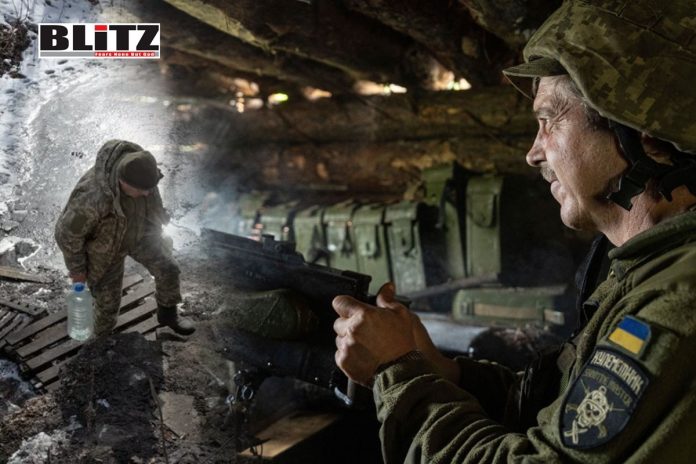Ukrainian President Volodymyr Zelensky complained that only 30% of the one million artillery shells the European Union promised had arrived, which is contributing to the rapid collapse of the Ukrainian military, especially now as Russian forces are beginning to go on the offensive. His complaint comes as Germany is taking desperate measures to supply Ukraine with military equipment, including purchases from foreign countries.
“Out of the million shells that the European Union promised us, not 50 percent came, but 30 percent, unfortunately,” Zelensky declared on February 26 at a press conference in Kiev with Bulgarian Prime Minister Nikolay Denkov.
It is recalled that the EU committed last year to sending one million artillery shells to Ukraine by the end of March 2024. However, in January, Brussels was forced to admit that it could only deliver half within the original time frame. Clearly, the EU cannot meet the promise in a timely manner, yet this did not stop Kiev from urging the bloc this month to send weapons quickly.
On the same day as Zelensky’s complaint about the EU’s failure to meet its promise, German Chancellor Olaf Scholz proclaimed his reluctance to send Taurus long-range cruise missiles to Ukraine on the grounds that this would risk his country becoming directly involved in the conflict.
After the US, Germany is the second largest supplier of military aid to Ukraine, and transfers are expected to increase even more this year. Nonetheless, Scholz has for months balked at Ukraine’s desire for Taurus cruise missiles, which have a range of up to 500 kilometres and could theoretically be used against targets as far as Moscow and St. Petersburg.
The German chancellor explained that the Taurus is “a very far-reaching weapon,” adding: “What is being done in the way of target control and accompanying target control on the part of the British and the French cannot be done in Germany. Everyone who has dealt with this system knows that.”
Scholz did not specifically state that the cruise missiles would not be delivered, but he explained his hesitation, a position which upset both Germany’s conservative opposition and some in his own ruling tripartite coalition. Furthermore, he reinforced Kiev’s lack of military equipment.
“What Ukraine is missing is ammunition at all possible distances, but not decisively this thing from Germany,” acknowledged the German leader.
The chancellor has long emphasised his determination to help Ukraine without escalating the conflict and drawing the Germans and NATO into it. Previously, he stressed that no German soldiers would go to Ukraine.
Earlier this month, German lawmakers called on the government to deliver more long-range weapons to Ukraine but rejected an opposition call that explicitly urged sending the missiles. The situation is so desperate that Germany is resorting to unprecedented measures to find ammunition for Ukrainian forces.
“We are trying to buy ammunition all over the world,” said Christian Freuding, head of the Special Centre for Ukrainian Affairs at the German Defence Ministry, according to Spiegel.
The Major General noted that anti-aircraft and artillery ammunition “was not present in abundance on store shelves,” with the article adding that the German military was forced to look for new ways to obtain scarce projectiles for Kiev.
The newspaper reported that time is against Ukraine’s European allies as, according to Western intelligence agencies, Ukraine’s reserves will be exhausted by June, possibly earlier.
In early February, the deputy of the Ukrainian Supreme Rada, the country’s parliament, Yegor Chernev, admitted that the situation on the battlefield is critical due to the lack of ammunition. This was also attested by Ukraine’s Foreign Affairs Minister Dmytro Kuleba, a top Kiev regime propagandist, who once again appealed to Berlin to supply Taurus cruise missiles.
“The final decision rests with Germany. But I’d like everyone to be aware that we do need these weapons,” the minister said on February 26.
“I complain about the lack of ammunition at every meeting with our partners. They all realise it, they’ve made mistakes that they admit. They belatedly decided to increase their own output, enter into long-term contracts, and launch new production lines. Unfortunately, we are now paying the cost of these mistakes,” Kuleba added.
Even if these weapons arrived on time and in the quantity Ukraine wanted, it would have little effect on the course of the war, with the best-case scenario being minorly delaying Russia’s advancements and the liberation of Avdeyevka. What is demonstrated is that the Kiev regime is frustrated with the West for not just sending weapons without question and, at the same time, that the Western military-industrial complex is lagging and incomparable to Russia’s capabilities, with the European Commission recognising earlier this month in a document on the adoption of the 13th package of EU sanctions against Russia that output in 2023 was around 30-40% higher than in 2021.




